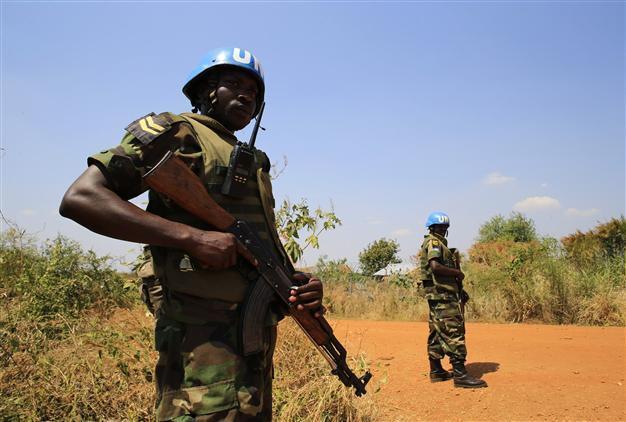UN warns South Sudan over alleged crimes against humanity
JUBA - Agence France-Presse

United Nations Mission in Sudan (UNAMIS) personnel guard South Sudanese people displaced by recent fighting in Jabel, on the outskirts of capital Juba December 23, 2013. REUTERS Photo
United Nations chief Ban Ki-moon has warned warring factions in South Sudan that reports of crimes against humanity will be investigated, as eyewitnesses spoke of a wave of brutal ethnic killings.The secretary general asked the Security Council to nearly double the size of the UN mission in the country, which has been hit by more than a week of escalating battles between troops loyal to President Salva Kiir and those backing his rival Riek Machar, a former vice president who was sacked in July.
UN bases in the capital Juba and across the country have been flooded with tens of thousands of civilians, many of whom have recounted an orchestrated campaign of mass killings and rape by government forces.
The official toll is 500 dead, although the real figure is believed to be far higher, aid workers say. Hundreds of thousands of others have fled to the countryside, prompting warnings of an imminent humanitarian disaster.
Rebel fighters are also reported to have committed atrocities in areas they control, as the oil-rich but impoverished nation, which won independence from Sudan to much fanfare just two years ago, appeared to be slipping deeper into civil war.
"Let me be absolutely clear. The world is watching all sides in South Sudan," Ban told reporters ahead of emergency Security Council talks on the crisis.
"The United Nations will investigate reports of grave human rights violations and crimes against humanity. Those responsible at the senior level will be held personally accountable and face the consequences -- even if they claim they had no knowledge of the attacks." Ban recommended the Security Council send 5,500 more soldiers to reinforce the UN's current 7,000-troop mission in the country, a move diplomats said was likely to be approved in a vote on Tuesday.
President Kiir has accused Machar of starting the fighting by attempting a coup, while Machar says the president has exploited tensions within the army to carry out a purge. Rebels loyal to Machar have since seized control of several areas north of Juba.
The unrest has also taken on an ethnic dimension, pitting Kiir's Dinka tribe against the Nuer tribe, to which Machar belongs.
Speaking from the relative safety of a UN base in Juba, two ethnic Nuer men alleged they were arrested by government soldiers along with an estimated 250 other men, herded into a police station in the capital Juba and then fired on.
"It was horrible, because to survive you had to cover yourself with the bodies of dead people, and... the bodies started to smell really bad. I don't want to talk much about it," said one of the men, named Simon, who would only give his first name for fear of reprisals.
"We remained only 12 people. The rest were killed off," said Gatwech, another survivor and witness to the alleged massacre, who was also nursing several wounds and recounted similar details.
The government denied it is behind any ethnic violence.
"This is not a tribal problem," South Sudan's army spokesman Phillip Aguer told AFP, denying any soldiers in uniform were committing atrocities.
"That is not true. There are criminals in Juba that have been killing people and they were there before," he said.
The testimonies cannot be independently verified because the movements of the few journalists and aid workers in the city have been severely restricted.
AFP tried to visit the scene of the alleged massacre, but was turned away by men in uniform and plainclothes forces. But the stench of death in the area was overpowering, with flies swarming around. The walls of the building were also riddled with holes.
Accounts from several other witnesses paint a picture of a brutal pattern of ethnically motivated violence.
Another ethnic Nuer man said he fled his position in South Sudan's presidential guard on Sunday after witnessing a week of killings and rapes and fearing his comrades would eventually turn on him.
He said violent house-to-house checks were being carried out, and that anyone not answering the question "In choli" -- meaning "What is your name?" in the Dinka language -- would be dragged outside their home and shot.
There have also been reports of similar violence in areas north of Juba now held by rebels opposed to the president, including an attack last week on a UN base by ethnic Nuer youths at Akobo in Jonglei state that left two Indian peacekeepers dead and the civilians sheltering there feared murdered.
The UN has warned that its current force is ill-equipped to protect civilians sheltering in its bases, and the European Union's aid chief, Kristalina Georgieva, said the country was "at the brink of a humanitarian tragedy".
Machar's forces have since seized the town of Bor, capital of the powder-keg eastern Jonglei state and located just 200 kilometres (125 miles) north of Juba, as well as the town of Bentiu, capital of crucial oil-producing Unity state.
But Kiir vowed his army was "now ready to move to Bor", despite days of shuttle diplomacy by African nations and calls from Western powers for the fighting to stop.
However, US special envoy Donald Booth met with Kiir on Monday, saying the president was open to talks with Machar without preconditions.
Booth also said he met with a group of 11 senior figures in the ruling Sudan People's Liberation Movement "who remain detained in Juba" following their arrest after the alleged coup attempt, adding they were "secure and well taken care of".
















